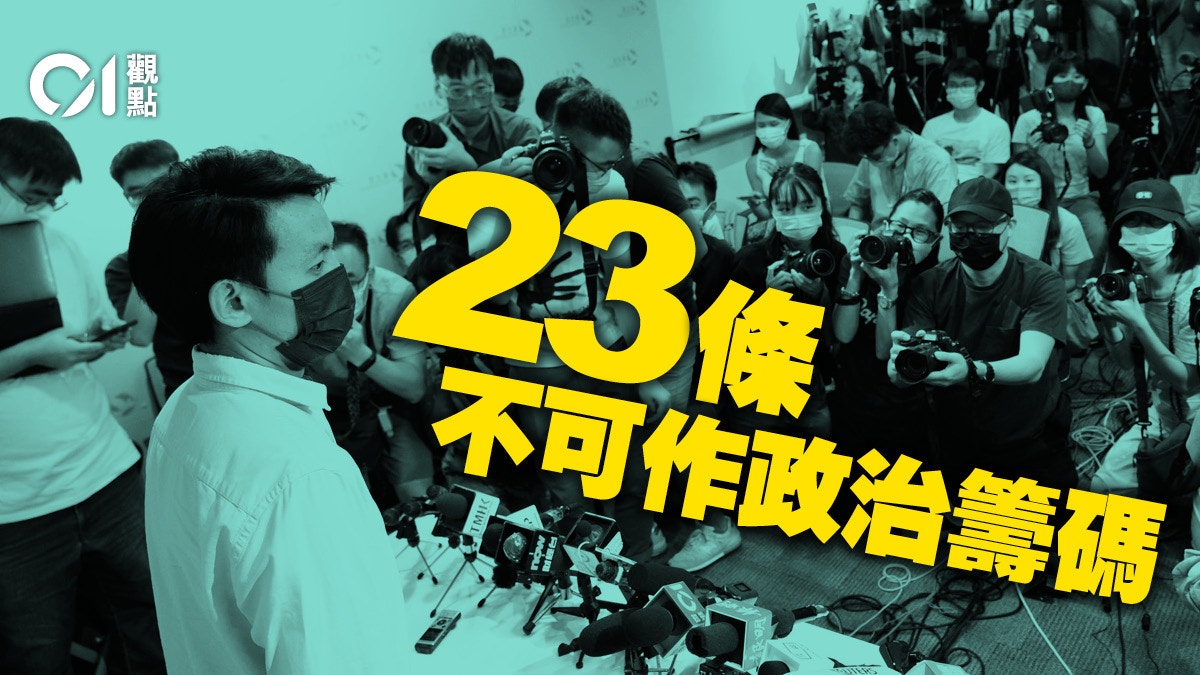As the Legislative Council election is approaching, some non-establishment candidates seek the Democratic Party to support them in running for the election.
In this regard, the Democratic Party sent a questionnaire to candidates applying for the support of the party or individual party members to find out whether their political ideas are similar to that of the party.
The questionnaire asked about the legislative issue of Article 23 of the Basic Law. Some Democrats said that the party has always believed that the time to legislate Article 23 is favorable after full universal suffrage. Therefore, it will also consider whether to support candidates based on this.
This attitude of the Democratic Party actually reflects the political stance of some Hong Kong people.
However, as long as we examine the historical context, we will understand that this is one of the keys to deepening the mistrust between Hong Kong and the Central Government.
The political movement in Hong Kong has become more extreme, and the issue of Article 23 legislation can be said to be a starting point.
After the central government formulated the "Hong Kong National Security Law" and revised the election system, Hong Kong people should recognize the political reality and rebuild mutual trust with the central government in a pragmatic manner.
Reject 23 distrust of each other
In 2003, the Tung Chee-hwa government promoted Article 23 legislation, but inferred that there was insufficient work, which triggered a demonstration of 500,000 people.
At that time, many people believed that the authorities’ failure to force Article 23 legislation was equivalent to the “victory” of Hong Kong people. However, we must not forget that the central government revised the framework of Hong Kong’s political development the following year and interpreted the original trilogy. Changed to five steps, Hong Kong must first submit a report to the Standing Committee of the National People's Congress for recommendations before launching political reforms in Hong Kong, and the latter will decide whether to start.
The reason for this is that the social backlash caused by the Article 23 legislation has hit the central government’s trust in Hong Kong. The objective result is a tightening of political reforms.
Under the control of the central government, the vision of "0708 double universal suffrage" proposed in 2003 was not realized and was rejected by the Standing Committee of the National People's Congress.
Hong Kong people think that the Tsang Yam-quan government is too conservative in accordance with the political reform plan proposed by the central government, but on the other hand, after experiencing the failure of Article 23 legislation, the central government also believes that Hong Kong is politically unstable and cannot guarantee national security, and is unwilling to trust Hong Kong.
Both of them were unwilling to give way, and the result was just a see-saw situation.
Inevitably, the anti-Chinese religion movement in 2012 also made people feel that Hong Kong people were full of resistance to "one country". Together with the Occupy Central movement, the central government adopted the "831 Decision" to further increase the safety factor in 2014.
After that, even though the Occupation Movement continued for a long time and received responses from many citizens, the "831 Decision" was not cancelled, and the political reform plan proposed by the government on this basis was ultimately rejected in the Legislative Council.
Looking at it in this context, we should see more clearly the impact of the anti-revision movement in 2019 on the political mutual trust between Hong Kong and the Central Government.
Give up confrontation and rebuild mutual trust
Judging from the controversy over the past two decades, Hong Kong people have increasingly rejected the central government in politics. Not only did they fail to win universal suffrage and political reforms, but in exchange for the political red line to narrow.
Should Hong Kong people now recognize that they continue to confront the central authorities with a confrontational attitude and cannot change the current narrowing of the political space in Hong Kong?
+1
From the perspective of political reality, it is fundamentally difficult for Hong Kong to have room for bargaining with the central authorities on national security issues. The central authorities will not compromise on these issues, especially after the anti-regulation turmoil.
On the contrary, still insisting that there be universal suffrage before Article 23 legislation will only make it more difficult to rebuild political mutual trust.
Regardless of whether some people completely deny the constitutional responsibility of Article 23 legislation, we must also realize that Article 23 cannot be used as a political bargaining chip to "exchange."
In particular, the "Hong Kong National Security Law" can be learned from the past, and Hong Kong should actively participate in its legislation to ensure that it can take care of the concerns of Hong Kong people.
In the era of post-anti-amendment legislation and the new normal of the National Security Law, Hong Kong's most important thing is to rebuild political mutual trust with the central government.
In addition to Article 23 of the legislation, Hong Kong should also let go of the mentality of confrontation and game with the central government in all aspects, but actively expand the space for dialogue with the central government.
Only by rebuilding mutual trust between the two sides can new hopes be opened for Hong Kong politics.
The veterans of the Democratic Party once again advocated that the pan-democratic party should rise to the challenge. The Democratic Party should have its own line and continue to use elections as a means of agenda setting [Hong Kong National Security Law] Legislation has internal tensions, rebuilds mutual trust, and improves mutual trust and assistance.

